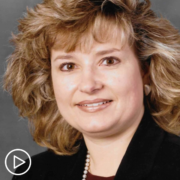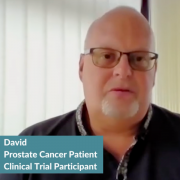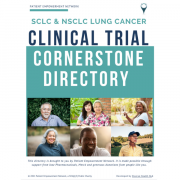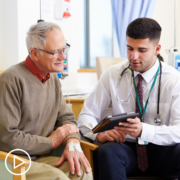Expert Advice for Newly Diagnosed Advanced Non-Melanoma Skin Cancer Patients
Expert Advice for Newly Diagnosed Advanced Non-Melanoma Skin Cancer Patients from Patient Empowerment Network on Vimeo.
Dr. Anna Pavlick provides three key pieces of advice for newly diagnosed advanced non-melanoma skin cancer patients to help them feel empowered in their care and treatment decisions.
Related Resources:
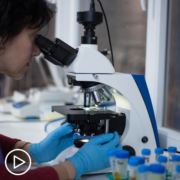
What Do Advanced Non-Melanoma Skin Cancer Patients Need to Know About Treatment and Research? |

|

|
Transcript:
Katherine:
What three key pieces of advice would you have for a patient who has just been diagnosed with advanced non-melanoma skin cancer?
Dr. Pavlick:
I think the first one is number one: do your homework. Don’t just take anything for face value. You know, I tell my patients, “This is your life. If you go and do research about what appliance you’re going to put in your kitchen, I think you should also do a little bit of research about what doctor you’re going to allow care for you.” And so I always tell everybody, “Did you do your homework? Are you sure you’re in a place that is going to be able to provide you with the care that you need? Are the physicians that you’re seeing experienced in the disease that you have?” Because they may be brilliant physicians, but they may not have any expertise in that particular area. And so I think it really behooves people to – I tease my patients, I ask them if they go to “Google Medical School.”
And really, find out a little bit about our backgrounds, find out about the institution that you’re going to, and learn a little bit about the disease. I’m certainly not saying come in and tell us what you want to have done, because I would hope that it takes many years of training and expertise to know how to make a good decision. But I think the more that patients know about the physicians that they’re seeing, and their level of expertise, and their interest, the better the outcome’s going to be. So that’s number one, number two is consider clinical trial. If you are a candidate for a clinical trial, consider it.
Because we are taking promising agents and looking for ways to make patients have better outcomes. And so, many times when we talk about clinical trials, we know about the drugs, we know about their side effects, we know their efficacy, but we’re looking to find ways to make those drugs work even better. And sometimes it may be adding radiation to one of the standard drugs we have. It may be adding a different type of targeted therapy to the medicines that we have. Sometimes it’s actually taking a research medicine that looks really, really good and very promising, and adding that extra research drug to a standard drug to see if we can’t do better.
So that I think is really – my second point of advice is really consider participating in a clinical trial if it’s applicable.
Katherine:
Mm-hmm.
Dr. Pavlick:
And so what’s my third one? My third one is to really make sure that you can communicate with your team, that you trust your team, and you feel comfortable with your team. You know, there are many of us who have the expertise, but we all have very different manners in which we communicate and talk to patients and speak with family members. If you’re not comfortable with the person that you’re seeing, there is absolutely nothing wrong with going to get a second opinion to find someone who has the same level of expertise who may just fit your personality better.
You know, everybody’s different. You have to find the health care team that fits for you. And I think that’s so important, because you’re trusting us with your life. And if you don’t feel comfortable, then we shouldn’t be the ones taking care of you.
Katherine:
Yeah. This is all about self-advocacy.
Dr. Pavlick:
That’s right.
Katherine:
The more you know, the better care you’re going to get, and the more comfortable I think you’ll feel with your treatment.
Dr. Pavlick:
Correct.
Katherine:
Yeah.
Dr. Pavlick:
And again, I think treatment – yes, people come to us for our recommendations, but it really is a team effort. My feeling is the more that patients understand why we’re doing what we’re doing, and are part of that decision-making process, the smoother treatment goes.
Katherine:
Sure.
Dr. Pavlick:
I really think education is important – of the patient and the family.
I think being able to ask your physician questions without feeling that you’re threatening – it’s something you should be able to do. And I think it just provides with better care.
Katherine:
Dr. Pavlik, how do you empower patients?
Dr. Pavlick:
You know, when I talk to patients I really do try to number one: educate them. I am big believer in bad artwork, because I’m a bad artist. And so I really try to draw out schematics to help patients understand how they therapy that I’m proposing is going to work, so they understand the mechanism. Patients will also go home with printed handouts so that they can go back and read about what we talked about, because many times patients absorb maybe one-quarter of what’s been said in a consult.
I encourage people to bring their family members or friends so that they can hear; two sets of ears is always better than one. And I fully support them; if they want to go get a second opinion, my answer is, “Absolutely.” I do not get offended. I feel that if – because a lot of times the patient’s going to say, “I don’t want a second opinion, but my family does.” You’ve got to live with your family. Go get the second opinion. 99 percent of the time, experts who do this for a living all have the same answers. And so it just is going to solidify for your family that the right thing is being done, and then you can also decide where do you feel most comfortable?
If Dr. A and Dr. B tell you the same thing, what environment do you feel most comfortable in, so in the event that you had questions, or you didn’t feel well, where do you want to go? So, I strongly encourage that. And if somebody comes back and says, “You know, I really think that this place fits me better,” my answer is, “That’s absolutely fine; thank you for letting me know. If there’s anything I can do, please reach out.” Because, again, bottom line is I just want the best outcome for the patient.

